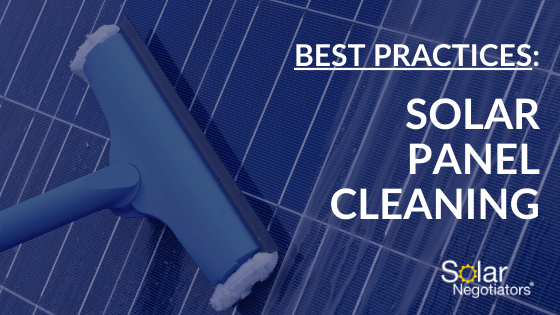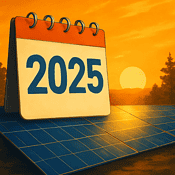
Best Practices: Solar Panel Cleaning
A Necessary Maintenance To Optimize System Performance
Some of the most frequently asked questions we receive involve the maintenance and cleaning of solar panels. Why? How often? With what tools? Is rain sufficient?
Yes, solar panel cleaning is important to keep your solar panels clean. Your solar panels must be exposed direct to sunlight to produce power. Rooftop solar panels get dirty primarily from wind-blown dust and pollen. Just like dust gathers on your window sills and shelves, debris from the environment is constantly building up on your panels and decreasing their efficiency. Agricultural areas, where pollen, dust, and other airborne particles are common are even more susceptible to potential production issues.
Benefits of cleaning
We highly recommend getting a cleaning with an annual inspection to keep your solar system operating at peak performance. We also suggest hiring a professional to perform the cleaning for your system. Safety is the main concern—since getting on your roof without the proper safety gear and experience is extremely dangerous.
A trained professional will also be able to spot potential issues that affect the health and performance of your system as well as assess any damage to the system to recommend the next steps. Cracks, hot spots, delamination, and nests can greatly affect production. In some cases, issues that arise from homeowners cleaning panels themselves can result in voiding your warranty.

Is rain sufficient to keep my panels clean?
While regular or steady rainfall does help with the dust build-up on your solar panels, we still recommend regular cleaning to ensure that your system is working at full capacity. While rain may remove dust, there are often other contaminants on the panels as well. Pollen, bird droppings, leaves, and ash all commonly accumulate on your panels and rain is not sufficient to remove these substances. A film can also form on your panels if you live in an area with high pollution or smoke in the air.
Just as you don’t rely on the rain to wash your car, you shouldn’t be relying on the rain to wash your solar panels. Professionals have the proper tools to ensure that your panels are cleaned and able to generate as much electricity as possible.
How much does solar panel cleaning cost?
As with anything, the cost varies depending on your location, the height/slope of your roof, and the number of panels in your system. In 2023, the average cost is around $200, with prices ranging anywhere from $5-$20 per panel.
How often do solar panels need to be cleaned?
How often solar panels should be cleaned depends on several factors. Your location and climate play a major role. For example, areas where there is steady rainfall do not need to be cleaned as regularly. Another factor to consider is the amount of wind-blown dust in your area. Also keep in mind the pitch of your panels, since steeply tilted panels will stay cleaner longer than horizontal panels.
Believe it or not, the type of water, soap, and brushes mean everything when it comes to solar panel care. Using a de-ionized water system gives a spot-free finish that is long-lasting and more resistant to becoming dirty. Hard water deposits can leave residue and build up over time, which will eventually affect your system’s production. Pressure washers should never be used, as the pressure could damage your panels and roof shingles.
For panels that are tilted at around 5 degrees or less, the use of a squeegee will ensure that no water is left behind on the panels. Leftover water could leave a puddle of muddy debris along the lower edge of the panel, and once dry, can accumulate a thick layer of dirt along the lower row of cells. Depending on the design of the system, this can cause a decrease in output.
How to keep your panels efficient between cleanings
Keeping your panels clean is the best way to ensure that they are working efficiently. However, there are a few things that you can do to make sure your panels are working efficiently between cleanings.
A few options include special coatings that repel dust or dirt, or tools to measure the buildup and notify you when it is time to clean your panels. Both of these can prolong the length between cleanings and ensure that you are cleaning at the right time for maximum efficiency.
What if I want to clean my panels myself?
Though we strongly recommend using a trained professional, the choice is up to you. At Solar Negotiators, we’re here to be a resource for you so you can make the best decision for you and your family. For homeowners who decide to clean their panels themselves, here’s a quick video of what we feel are the biggest DOs and DONTs when it comes to cleaning your own panels or check out the list below.

Dos of solar panel cleaning
- Solar panels can become incredibly hot in the sunshine. Either clean your solar panels in the morning/afternoon or pick a relatively cool day.
- Clean the surface of the solar panel with a soft-bristle brush.
- Read the solar panel manufacturer guide. Often, there are specific recommendations for cleaning solar panels in your manufacturer guide.
- If there are any leaves or visible accumulated dirt on your solar panels, before you start watering and cleaning with a cloth, bush off any leaves and dirt.
- For safety reasons, it is recommended that you clean your solar panels from the ground with a long-handed instrument whenever possible.
- Before cleaning, inspect panels thoroughly for any cracks, damage, or loose connections. Damaged solar panels represent electrical shock hazards.
- Wear protective clothing and gear.
Donts of solar panel cleaning
- Do not attempt to clean the wiring underneath.
- Do not use metal objects, abrasive detergent, or degreasers.
- Avoid using water with high mineral content.
- Do not use high pressure.
- Do not walk, lay, or place weight on panels.
- Do not submerge the panels partially or completely in water or any cleaning solution.
- Avoid using the rotating brush cleaning method, this can lead to the formation of micro-cracks.
- Do not scrape or scrub dirt when the panels are dry.
- Don’t splash water on the back side of the panels.

Recent Posts
Reduce your reliance on the energy grid.
Get Solar In
Your Inbox

Refer friends and get paid in-app
The more referrals you bring in, the higher your earnings.
Earn $1,000 for each referral, and bonuses of up to $1,500 once you hit your 10th referral.


